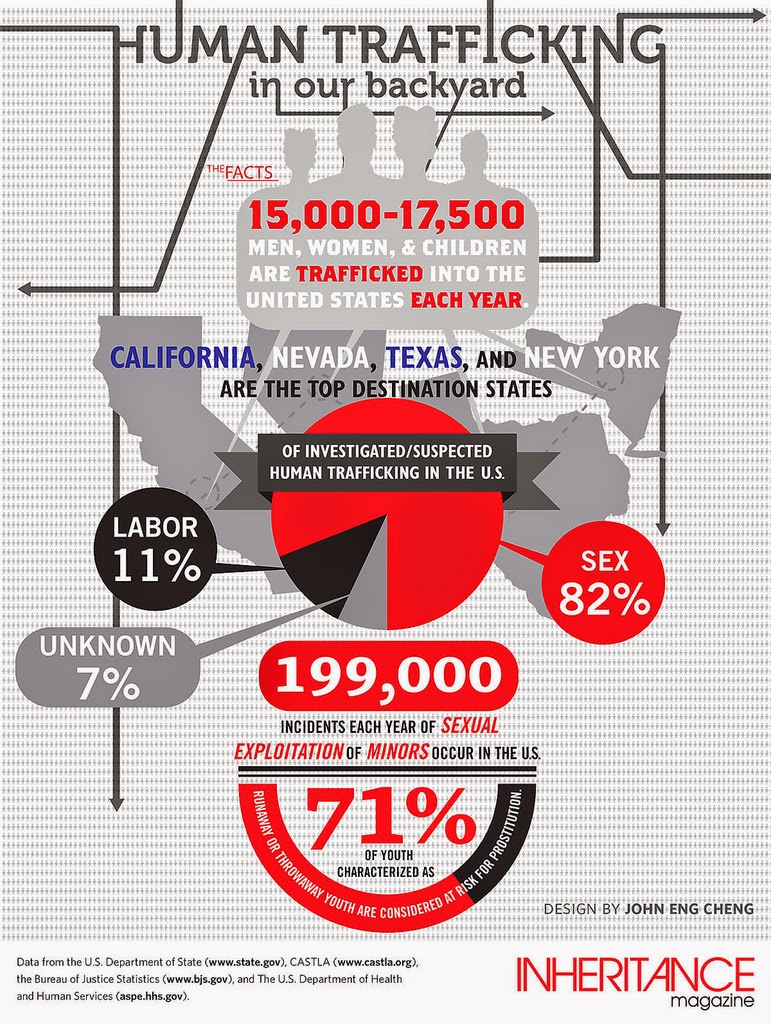Between 50 and 80 percent of commercially sexually exploited children in California in 2012 are or were formally involved with the child welfare system. In Los Angeles County's STARS court, 58% of the 72 sexually trafficked girls were foster care kids. 60% of the children reported missing in 2010 were in foster care or group homes before they ran away. In 2013, 60% of the child sex trafficking victims recovered as part of a FBI nationwide raid from over 70 cities were children from foster care or group homes.
Foster care has became the training ground in the country for being bought and sold for sex. Many of the kids in foster care are vulnerable to becoming sexually exploited. Sex traffickers have no fear of punishment because there is a lack of attention towards foster kids that go missing. Foster kids are used to kids who control their lives and they are not used to having true relationships or attachments.This is because they accept and normalize the idea of being used by people who are supposed to care for them as an object of financial gain. The "nothing but a paycheck" theory is the reason that foster youth normalize the idea of being used for financial gain. When they are taken into a neglectful home, they begin to believe their purpose is to bring income into a household. They do not recognize the difference between the idea of bringing in money for their foster parents and bringing in money for traffickers. Foster kids are also accustomed to moving between multiple homes, so they easily adapt to when a trafficker moves them multiple times as well. Most victims of human trafficking experienced sexual abuse growing up. It is 28 times more likely that a victim of sexual abuse will be drawn into trafficking than those who were not abused.How they are treated in foster care resembles how they are treated in trafficking.
Above is a picture of Withelma "T" Ortiz Walker Pettigrew. She is a survivor of child sex trafficking. She was born into the foster care system and stayed in it for the first 18 years of her life. She spent 7 of those 18 years being sexually trafficked on the streets, Internet, strip clubs, massage parlors, and in the back of express papers. She experienced trauma within the foster care system and previous to it, which allowed her to become more vulnerable. She was one of the kids who has normalized the idea of being exploited for financial gain. She says that even though it's tough to admit, the most consistent relationship she ever had in care was with her pimp and his family.
In order to help this issue, there needs to be better safety in foster care. There has to be better protocols to screen foster parents and their families, funding for group homes must be re-evaluated and monitored, and children in care who are abused cannot be punished for disclosure. The Preventing Sex Trafficking and Strengthening Families Act was created in 2014 in the House of Representatives. It makes critical reforms to foster care laws. The main goal is to work to identify kids most vulnerable to predators and take steps to protect them from abuse. The bill increases the reporting requirements for foster parents and child welfare agencies. It encourages the identification of at-risk youth and develops ways to ensure better information is provided to caseworkers assigned to these children. The bill also addresses the current, strict foster care policies, and works to lessen the limits placed on these kids in regard to common activities that are part of transitioning into adulthood. The strict rules can cause kids to become isolated and separated from family and friends, which makes them more vulnerable to victimization.
There are also organizations that accept donations that work towards this issue. One of these organizations is My Life My Choice. This is a survivor-led organization that works to overcome the commercial sexual exploitation of children. They offer survivor-led services such as providing training, prevention groups for vulnerable children, survivor mentoring to children who are victims of commercial sexual exploitation, and advocacy and leadership development.
The sexual exploitation of the already vulnerable kids in foster care is an issue that does not receive the attention it deserves. They do not deserve to be used in this way just because they do not have a solidified family. There are many organizations and groups speaking out to help these kids. Below are just a few facts about sex trafficking.




















